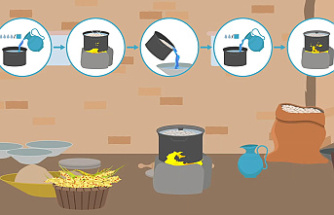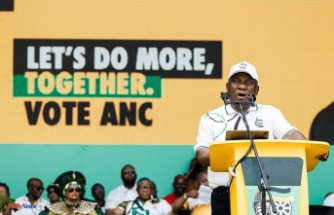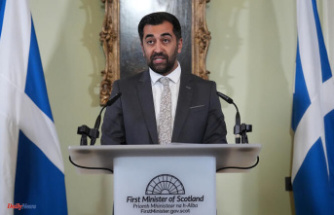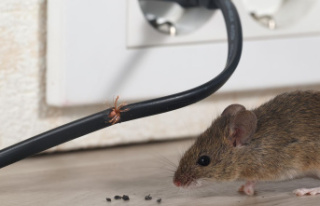At only 20 years old, Abdou* was threatened with death and suffered ostracism from his family. He bears witness to an almost impossible life in Senegal and the social exclusion of homosexuals in his country.
"The situation is getting more and more serious," he said. "The anger that people have...it's not something that existed before."
Tensions over this taboo issue in Senegal are growing, marked by an increase in discrimination, according to human rights organizations.
In this 95% Muslim and very practicing country, homosexuality is widely considered deviant. The law punishes with imprisonment from one to five years the so-called acts "against nature with an individual of his sex".
"The situation of the LGBTQI community is very complicated, especially the last year and a half 'characterized' by a massive campaign 'against homosexuality' led by religious and conservative associations who allegedly want to restore Senegalese values", says the AFP Ousmane Aly Diallo, researcher at Amnesty International in the office for West and Central Africa.
“It is more risky today to display your LGBTQI identity publicly than a few years ago; there are more and more attacks against members of this community, often filmed and broadcast on social networks”, he notes.
In May 2021 and last February, thousands of people demonstrated in Dakar to demand a strengthening of the repression of homosexuality.
The subject is also instrumentalized politically. The main opponent Ousmane Sonko has made the fight against homosexuality a campaign argument for the legislative elections on Sunday.
- "You make me ashamed" -
Abdou's childhood and adolescence were traumatic, to undergo the "spiritual" baths of marabouts to cure his supposed "disease" and his effeminate side, to hide to live his sexuality. He was beaten by relatives and attempted suicide.
Until that day when his life changed at the end of 2021. A cousin spies on him and reports to his father a conversation with an LGBT network.
His father, divorced from his mother, immediately drives him out of the home. "He sent me messages where he said you make me ashamed; you don't deserve to live...".
Abdou contacts an association abroad which helps him to flee to a country in the region. He took shelter there for five months, but at the beginning of May, his mother, who remained in contact, convinced him to return.
Since then, Abdou has holed up at home. Fearing for his life, his mother locks him in her room when she hears about an attack...
The "goor-jigéen" (man-woman in Wolof) have long been part of the social landscape. "But what we note today is really intolerance to LGBTQI identity," notes Mr. Diallo. "This increasingly dangerous and very political intolerance is due to the rise of religious discourse and religiosity in Senegal and (...) to the weakness of institutions in the face of this rise".
Sociologist Djiby Diakhate explains that "for many Senegalese, if homosexuality develops, it will be a disaster; we will experience drought, epidemics, bad luck".
Abdoulaye Guissé, a 28-year-old student, confides "not seeing why Senegal must change its position to give more space" to homosexuals. "They just have to do their practices discreetly; the citizens are not ready to live with them".
Malamine Bayo, 32, recommends "studying the question to see if it is not a disease", or, "if it is by choice", to "supervise these people so that they can live without difficulty ".
In recent years, Islamic groups, whose members have mainly studied in Arab countries, have been at the forefront of the fight against homosexuality in Senegal. It is also decried as an instrument used by Westerners to impose values that are supposedly foreign to the culture of the country.
- "Deplorable tension" -
In mid-May, a controversy shook France and Senegal around Paris Saint-Germain football player and Senegalese international Idrissa Gana Gueye, accused of having refused to join the fight against homophobia during a game in France. He received an outpouring of support in Senegal.
At the same time, an American artist visiting Dakar was violently attacked - the video posted on the internet - by a crowd of dozens of men, who because of his style accused him of being a homosexual.
At the initiative of the Islamic NGO Jamra, 11 deputies tabled a bill in December 2021 which would have punished homosexuality with a sentence of five to ten years in prison. It was rejected by Parliament, which considered the existing legislation to be quite severe.
For the spokesperson for the NGO Mama Mactar Gueye, the LGBT community "poses a problem" because it has "begun to invade the public space" and to "provoke". According to him, the country is in "deplorable tension" and a law would protect "society, but also" homosexuals from "popular justice".
In 2021, Senegal was removed from the list of safe countries of origin by the French Office for the Protection of Refugees and Stateless Persons (Ofpra), due to the risks associated with sexual orientation.
While South Africa has some of the most progressive legislation on LGBTI rights and several countries have legalized same-sex relationships, Amnesty notes in its latest report that in several countries on the continent, people have been harassed, arrested and prosecuted because of their sexual orientation. In some of these countries, however, an LGBT community expresses itself, which is unthinkable in Senegal.
In the absence of official data and given the diversity of contexts, experts note that it is difficult to establish the level of persecution in Senegal compared to other African countries where the situation is also tense.
- Double life -
When homosexuality is revealed, the entourage often sees in the violence of his reaction the only way to save his "reputation".
This is what Daouda*, only son, who led the life of a student, experienced until the day his father learned of his homosexuality. "He then took out a gun, he wanted to shoot me (above)...".
Daouda fled to a country in the region, where AFP met him, cut off from his family for eight years.
"In Senegal, living with homosexuality means being in danger from morning to night; it's a very dark path". Several of his friends committed suicide. They couldn't live in hiding.
In this context, many gays lead a double life. Until 3 months ago, this was the fate of Khalifa*, bisexual. Married for 4 years, he lived until he was 34 without his entourage suspecting anything. Recently "denounced", he lost his job, his career.
His father threatened to "kill him", he no longer sees his wife or child and survives in a town far from Dakar.
Khalifa sees no other choice but to seek asylum abroad, as an anti-LGBT movement has identified him and risks stalking him or publishing his name on the internet.
Abdou too would like to leave Senegal for a place where he is "accepted" and to take his mother away from the stigma.
"If I leave, it will be peace for my mother...", he said, his voice broken.
*Names changed for security reasons.












